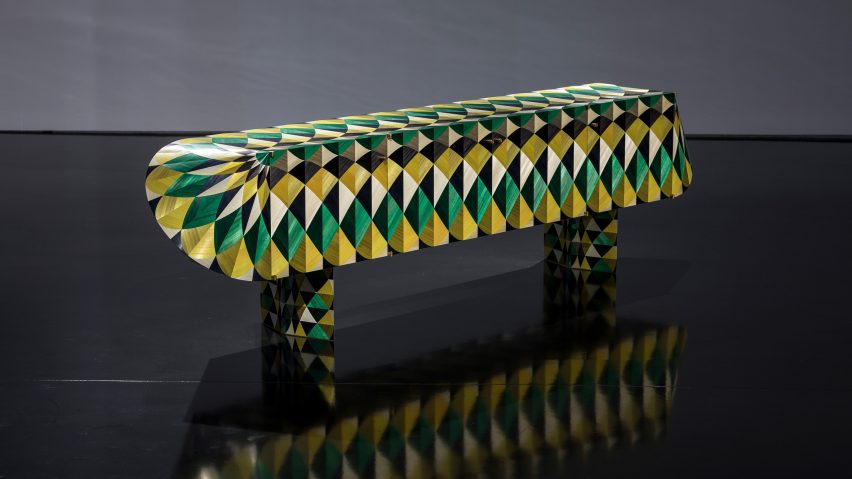The Exquisite Corpse collection comprises three handmade furniture pieces decorated with a modern take on straw marquetry in vibrant, custom-dyed colours.
The line, which has been shortlisted for a Dezeen Awards 2020 in the furniture design category, is a collaboration between Australian industrial designer Adam Goodrum and French marquetry artisan Arthur Seigneur, who make up design duo Adam and Arthur.
Their Exquisite Corpse collection comprises a tallboy, a console and a credenza, and was named after the French parlour game Cadavre Exquis, invented by members of the avant-garde Surrealist art movement in 1925.
"In the game, a player sketches a body part or other image on a piece of paper, before folding the paper to conceal what they've drawn and passing it on to the next player, and so on," Seigneur told Dezeen.
"The completed figures tend to be wildly inventive and frequently bizarre," he added.
"The game sums up our collaborative process and captures the wonderful tension in our back and forth decision making, with form, patterns and colours bound only by the mandate to celebrate straw marquetry's dazzling visual effects."
Adam and Arthur worked with artisan cabinet makers to build the furniture, which was then covered with straw marquetry – the 17th-century art of creating hand-crafted decorative patterns from thin, flattened strips of rye straw – by Seigneur.
"For Exquisite Corpse, we wanted to push the reflective properties of straw that are amplified by different surface directions, and additionally challenge the traditional application of straw marquetry that is normally only reserved for the front flat surface," the studio said.
Every available surface has been decorated with the straw, which was laid with contrasting grain direction to create an additional illusion of three-dimensionality.
The Talleo tallboy uses more than 14,000 individual strands, the Longbow credenza 10,000 and the Archant console 7,000.
"The flexibility of the material allows us to apply the straw to any shape," Seigneur explained. "We have developed techniques with custom tools which allow us to apply curved patterns to three-dimensional forms."
The process of creating the surfaces is labour-intensive and slow – the three pieces in the collection, which were exhibited at Tolarno Gallery and sold to private collectors, took a year and a half to make.
Each strand of straw is unique, which gives the inlaid surfaces a natural irregularity and creates a painterly quality.
"Straw reflects light like no other lacquer in the world," Seigneur said. "Ecologically, straw is a wonderful material that has a minimal impact on our planet and is very fast and sustainable to grow."
The designers wanted to exploit "the power of colour" in its work and chose vibrant, custom-dyed hues for the marquetry.
They initially came up with the colour combinations on a computer, before creating scale models to finesse the designs. The straw, which is imported from Burgundy, France, was then hand-dyed by Seigneur.
"Through experimentation, Arthur has pushed the boundaries and achieved an ivory hue; something never done in straw before," the studio said.
Preserving traditional skills like straw marquetry is "critical" in a post-industrialised world, the studio said.
"Our consumerist, post-industrialised society means objects need to be made faster and faster," it added. "Straw marquetry has the luxury to be the opposite; its lengthy handmade preparation and application process rebels against the constraints of time."
Other projects shortlisted for the furniture design award include Vegahouse's Zalue Bamboo Basket Stool, made using a technique of "knitting" with bamboo.
Photography is by Andrew Curtis, except where stated.

